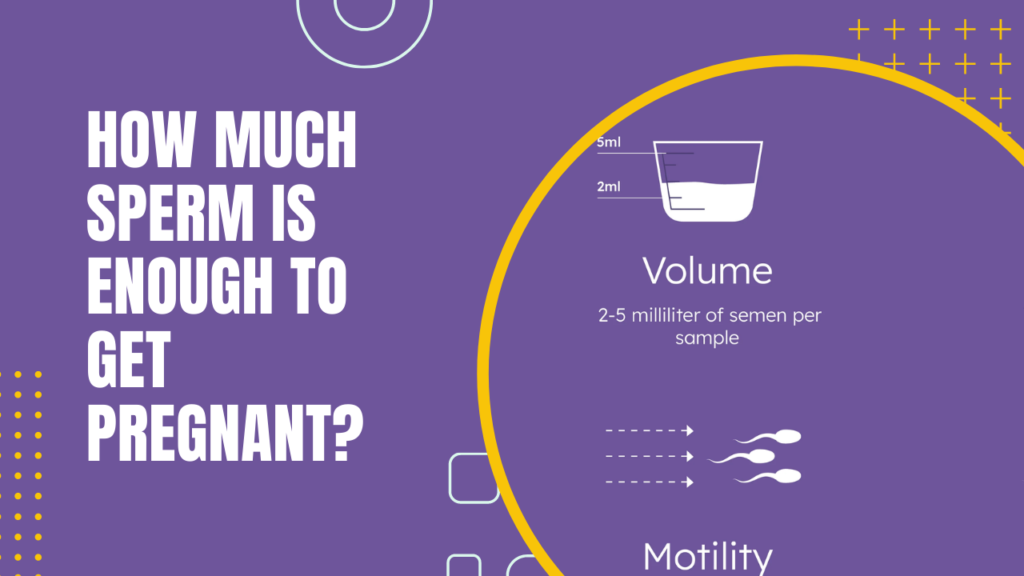Are you and your partner trying to conceive but wondering how much sperm is enough to get pregnant? Understanding the importance of sperm quantity and quality in pregnancy is crucial to maximizing your chances of conception. Luckily, experts have conducted studies that shed light on the role of sperm count, motility, shape, and size in fertilization.
In this article, we will delve into the scientific research behind sperm and pregnancy. You’ll learn about the factors that affect sperm quality, as well as methods to improve sperm quantity and quality. We’ll also discuss the role of the female reproductive system in pregnancy and how you can maximize your chances of conception. Plus, we’ll cover when to seek fertility treatment if necessary.
Keep reading to become an expert on sperm and pregnancy!
The Importance of Sperm Quantity and Quality in Pregnancy
You might not realize it, but the quantity and quality of your sperm can significantly impact your chances of getting your partner pregnant. Sperm health is crucial when it comes to pregnancy, and male fertility issues can pose a significant challenge to couples who are trying to conceive.
In fact, studies have shown that male infertility is the sole cause of infertility in about 20% of couples, and a contributing factor in another 30-40%. Sperm quality refers to the overall health of the sperm, including its shape, motility, and ability to fertilize an egg. If the sperm is not healthy, it may not be able to swim properly, or it may not be able to penetrate the egg, making it difficult for pregnancy to occur.
Poor sperm quality can also lead to genetic abnormalities in the offspring, making it important to address any male fertility issues before trying to conceive. On the other hand, having a healthy quantity of sperm can also increase your chances of getting your partner pregnant. A higher sperm count means that there are more sperm available to fertilize the egg, increasing the likelihood of conception.
However, it’s important to note that having a high sperm count doesn’t necessarily mean that the sperm is healthy, and vice versa. So, it’s important to focus on both the quantity and quality of your sperm when trying to conceive.
Understanding Sperm Count
Comprehending the number of sperm present in semen is a key factor in understanding male fertility. A man’s sperm count is the number of sperm cells in a given amount of semen. The average sperm count for a healthy male is between 40 and 300 million per milliliter of semen.
When it comes to testing sperm count accuracy, there are a variety of methods available. The most commonly used method is a semen analysis, which is performed in a lab. The lab technician will examine a sample of semen under a microscope to determine the number of sperm present.
There are also at-home sperm count testing methods available, such as sperm count kits that utilize technology similar to a home pregnancy test. However, these at-home tests may not be as accurate as a lab analysis and should be used as a general guide rather than a definitive diagnosis.
It’s important to consult with a healthcare professional if you have concerns about your sperm count or fertility.
The Role of Sperm Motility in Fertilization
Understanding the role of sperm motility is crucial in improving your chances of fertilization and achieving pregnancy. Sperm motility refers to the ability of the sperm to swim and move towards the egg for fertilization. This is a vital factor that determines the success of conception.
A high percentage of motility ensures that the sperm can reach the egg and fertilize it, increasing the chances of a successful pregnancy. Sperm movement is essential for conception. If the sperm is not able to move correctly, it cannot reach the egg for fertilization.
Studies have shown that men with low sperm motility have a lower chance of achieving pregnancy compared to those with higher motility. Therefore, it is crucial to have a good percentage of sperm motility to improve your chances of conception.
Sperm motility plays a significant role in fertilization and conception. A high percentage of sperm motility means that the sperm can reach the egg and fertilize it, increasing the chances of a successful pregnancy. Therefore, it is crucial to maintain a healthy lifestyle, avoid smoking, and limit alcohol consumption to improve sperm motility and increase your chances of achieving pregnancy.
The Impact of Sperm Shape and Size on Pregnancy
Learning about how sperm shape and size can impact pregnancy is fascinating and can increase your appreciation for the intricacies of the fertilization process. The shape of sperm plays a crucial role in its ability to fertilize an egg, as it needs to be able to swim through the female reproductive tract and penetrate the egg. Abnormalities in sperm shape, known as teratozoospermia, can make fertilization difficult and increase the risk of infertility.
Sperm size also plays a role in conception, as larger sperm may have a better chance of fertilizing an egg. However, it’s important to note that size isn’t the only factor in sperm’s ability to fertilize an egg. Sperm count, motility, and morphology also play important roles. In fact, some studies have shown that larger sperm may have reduced motility, which could impact fertility.
To get a better understanding of how sperm shape and size impact fertility, take a look at the table below:
| Sperm Shape | Fertility |
|---|---|
| Normal | Higher chance of fertilization |
| Abnormal | Reduced chance of fertilization, increased risk of infertility |
| Sperm Size | Fertility |
|---|---|
| Larger | May have a better chance of fertilization, but could have reduced motility |
| Smaller | May have reduced chance of fertilization |
Sperm shape and size are important factors in fertility and conception. While larger sperm may have a better chance of fertilizing an egg, abnormal sperm shape can make fertilization difficult and increase the risk of infertility. It’s important to remember that sperm count, motility, and morphology also play important roles in fertility, and couples experiencing difficulty conceiving should seek medical advice.
Factors Affecting Sperm Quality
When it comes to factors that affect sperm quality, there are a few things you should keep in mind. Your lifestyle choices can have a big impact. Things like smoking, drinking, and a poor diet can all harm your sperm. Additionally, certain medical conditions can also affect your sperm quality. So it’s important to be aware of any health issues you may have.
Adjusting the paragraph structure in this way makes it easier to read and understand the different factors that can affect sperm quality. Using contractions also makes the text more informal and conversational.
Lifestyle Factors that Affect Sperm Quality
Hey guys, did you know that things like smoking, alcohol, and stress can all have an impact on the quality of sperm?
In addition to these factors, your lifestyle choices can also affect your sperm quality. For example, your dietary choices can play a significant role in your sperm quality. Eating a diet rich in antioxidants, vitamins, and minerals can help boost your sperm count and motility. Additionally, avoiding processed foods, trans fats, and excessive amounts of sugar and caffeine can also improve your sperm health.
Exercise habits are another lifestyle factor that can affect your sperm quality. Regular exercise has been shown to improve sperm quality by increasing testosterone levels and reducing oxidative stress. However, excessive exercise can have the opposite effect and lead to decreased sperm production. Finding a balance between physical activity and rest is crucial for maintaining healthy sperm.
Overall, making positive lifestyle choices can have a significant impact on your sperm quality and increase your chances of fertilization.
Medical Conditions that Affect Sperm Quality
Now that you’re aware of the lifestyle factors that can affect your sperm quality, it’s time to talk about medical conditions that can also have an impact.
Unfortunately, there are several medical conditions that can affect sperm quality, including diabetes, infections, and hormonal imbalances. These conditions can lead to male infertility, which can be a frustrating and emotional experience for couples who are trying to conceive.
Fortunately, there are several treatment options available for men who experience male infertility. Depending on the underlying cause of the infertility, treatment options may include medication, lifestyle changes, or assisted reproductive technologies like in vitro fertilization.
It’s important to work with a healthcare professional to determine the best course of action for your specific situation. By taking proactive steps to improve your sperm quality and seeking out treatment options if needed, you can increase your chances of successfully conceiving a child.
How to Improve Sperm Quality and Quantity
Improving sperm quality and quantity can be achieved through lifestyle changes. These include reducing alcohol and tobacco use, maintaining a healthy diet, and engaging in regular exercise. Here are three ways to do it:
- Natural remedies and supplements can also help. Some examples include maca root, ashwagandha, and zinc. Maca root has been found to increase sperm count and motility, while ashwagandha has been shown to improve sperm concentration and morphology. Zinc is an essential nutrient for sperm production and can be found in foods like oysters, beef, and pumpkin seeds.
- Medical treatments and procedures may be necessary if lifestyle changes and natural remedies don’t work. For example, if a man has a low sperm count, a doctor may recommend intrauterine insemination (IUI). This involves directly injecting the sperm into the uterus during ovulation. If a man has a blockage in the reproductive system, surgery may be necessary to remove it.
- Lifestyle changes such as reducing alcohol and tobacco use, engaging in regular exercise, and maintaining a healthy diet can also improve sperm quality and quantity. Men who are overweight or obese tend to have lower sperm counts and more abnormal sperm. Therefore, losing weight can be beneficial. Exercise can also reduce oxidative stress and inflammation in the body, which can improve sperm quality. Additionally, stress can negatively impact sperm production, so finding ways to manage stress, such as through meditation or yoga, can also be helpful.
The Role of the Female Reproductive System in Pregnancy
If you’re trying to conceive, it’s important to understand how the female reproductive system works. One key factor is ovulation, which is when an egg is released from the ovary and can be fertilized by sperm.
There are also several factors that can affect female fertility, such as age, health conditions, and lifestyle habits.
Understanding Ovulation
To understand ovulation, you’ll need to track your menstrual cycle and look for signs of ovulation such as changes in cervical mucus or a slight rise in body temperature.
Ovulation is the process where a mature egg is released from the ovary and travels down the fallopian tube, waiting to be fertilized by sperm. This process typically occurs once a month, and timing intercourse during this period is crucial for conception.
Here are three things you should know about ovulation and timing intercourse:
- Ovulation typically occurs around day 14 of a 28-day menstrual cycle, but can vary from woman to woman.
- The fertile window, or the period of time when pregnancy is most likely to occur, is usually five days leading up to ovulation and the day of ovulation itself.
- Sperm can survive in the female reproductive tract for up to five days, so having sex a few days before ovulation can still result in pregnancy.
Factors Affecting Female Fertility
Understanding the various factors that affect female fertility is crucial for couples trying to conceive. One of the most important factors to consider is the menstrual cycle. Women who have irregular periods or experience heavy bleeding may have difficulty getting pregnant. This is because irregular periods can make it difficult to predict ovulation, which is the time when a woman is most fertile.
Another factor that can affect female fertility is hormonal imbalances. Women who have abnormal levels of certain hormones, such as estrogen or progesterone, may have difficulty getting pregnant. This is because these hormones play a crucial role in regulating the menstrual cycle and preparing the body for pregnancy.
In some cases, hormonal imbalances can be corrected with medication or other treatments. However, it is important to talk to your doctor about any concerns you may have about your fertility, as there may be other factors at play.
By understanding the various factors that can affect female fertility, you can take steps to increase your chances of getting pregnant and starting a family.
Maximizing Your Chances of Conception
Boost your chances of getting pregnant by maximizing your fertility with these expert tips. Timing intercourse and tracking ovulation are two key factors in increasing your chances of conception. This means having sex during your most fertile days, which are the days leading up to and including ovulation.
Knowing when you ovulate is crucial in determining your fertile window, and there are many methods to track ovulation, such as using ovulation predictor kits, monitoring changes in cervical mucus, or tracking basal body temperature.
In addition to timing intercourse and tracking ovulation, there are other lifestyle changes you can make to maximize your chances of getting pregnant. Maintaining a healthy weight, eating a balanced diet, exercising regularly, and reducing stress can all positively impact fertility.
Smoking, alcohol consumption, and drug use can all negatively affect fertility and should be avoided when trying to conceive. It’s important to remember that even with optimal timing and lifestyle changes, getting pregnant can take time.
If you have been trying to conceive for more than a year (or six months if you are over 35), it may be time to consider seeking the help of a fertility specialist. They can provide further guidance and recommend treatment options if needed.
By taking steps to maximize your fertility, you can increase your chances of conceiving and starting or expanding your family.
When to Seek Fertility Treatment
If you’ve been trying to conceive for a year (or six months if you’re over 35), it might be time to consider seeking the help of a fertility specialist. While it’s natural to feel anxious and overwhelmed at the thought of seeking fertility treatment, it’s important to remember that you’re not alone.
Many couples struggle with infertility, and there are a variety of treatments available that can help increase your chances of conception.
Before seeking fertility treatment, it’s important to consider the cost. Fertility treatment can be expensive, and unfortunately, insurance coverage is not always available. However, many clinics offer financing options and payment plans to help make treatment more affordable.
Additionally, some employers offer fertility benefits as part of their health insurance plans, so it’s worth checking with your employer to see if this is an option for you.
Emotional support is also important during fertility treatment. Many couples experience feelings of sadness, anxiety, and disappointment throughout the process. It’s important to have a support system in place, whether that’s through a therapist, support group, or close friends and family.
It’s also important to communicate openly with your partner about your feelings and to support each other throughout the process. Remember, seeking fertility treatment is a brave and proactive step towards achieving your dream of starting a family.
Frequently Asked Questions
What is the minimum amount of sperm required to get pregnant?
To conceive, a sperm count threshold of at least 20 million per milliliter of semen is generally considered necessary. However, fertility implications vary based on factors such as motility and morphology of the sperm.
Can low sperm count be a result of lifestyle choices?
Smoking can negatively affect sperm count, leading to infertility. Poor dietary habits can also impact sperm production. Making positive lifestyle choices, such as quitting smoking and improving diet, can increase chances of conception.
Is it possible for a woman to get pregnant with abnormal sperm?
Abnormal sperm can affect fertility, but it is still possible to get pregnant. Sperm morphology plays a role in fertility, and genetic causes can lead to abnormal sperm. Consulting a fertility specialist can help determine the best course of action.
Can certain medications or medical conditions affect sperm quality?
Certain medications and medical conditions can affect sperm quality, leading to infertility. However, infertility treatments such as sperm banking can help preserve healthy sperm for future use. Consult with a medical professional for more information.
How long does it typically take for a couple to conceive with normal sperm count and motility?
On average, it takes a couple with normal sperm count and motility about six months to a year to conceive. However, fertility success rate may vary depending on factors such as age, lifestyle, and overall health.
Conclusion
So, how much sperm is enough to get pregnant? The truth is, there’s no magic number. While sperm quantity and quality play an important role in fertilization, it only takes one healthy sperm to fertilize an egg.
However, having a higher sperm count and motility can increase your chances of conceiving. To increase your chances of getting pregnant, there are steps you can take to improve your sperm quality and quantity. These include maintaining a healthy diet, exercising regularly, avoiding smoking and excessive alcohol consumption, and reducing stress.
It’s also important to have regular check-ups with your doctor to ensure any underlying health issues are addressed. By taking these steps and understanding the importance of sperm quality and quantity in pregnancy, you can maximize your chances of conceiving and starting a family.


